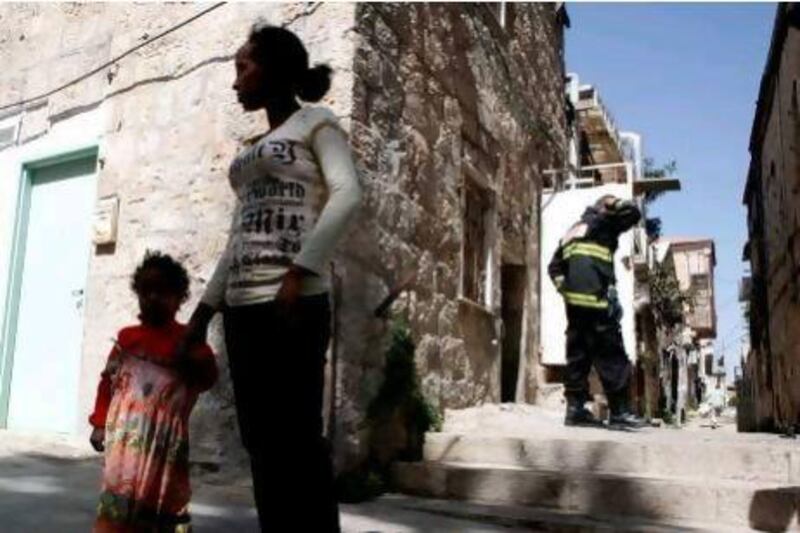TEL AVIV // Refugee advocates yesterday criticised as "draconian" Israel's announcement that it would begin jailing African asylum-seekers for up to three years, saying the measure would do little to deter more migrants from entering Israel illegally.
In another development that reflected hostility towards the newcomers arriving through the Israeli-Egyptian desert border, Benjamin Netanyahu, the Israeli premier, said yesterday that Israel will step up deportation plans for 25,000 of the migrants.
The tens of thousands of African asylum-seekers in Israel are increasingly drawing antagonism among Israelis, ramped up by a few rape cases involving the migrants and by right wing politicians' warnings about the dangers Israel faces should it fail to stem their influx.
Yesterday, arsonists set fire to an apartment in Jerusalem housing Eritrean asylum seekers, spray-painting "get out of the neighbourhood" over the entrance to the home. Police termed the incident as "very serious", as four of the residents were taken to a hospital with burns and smoke inhalation.
Rights groups have condemned Israel's refusal to grant asylum - or even review asylum applications - to almost all of the 60,000 migrants, mostly from Eritrea and Sudan, who have made long treks through the Sinai desert to cross into Israel over the last three years.
Israel claims the Africans came to seek better livelihoods and therefore do not qualify as refugees, but the migrants say they are fleeing persecution or war. Most have been driven to destitution because Israel refuses to examine their asylum requests or provide them with aid.
Israeli officials have said they hope to use the new legislation as a deterrent to dissuade more Africans from coming. Aside from an imprisonment of up to three years for the migrants, the law would also punish anyone who helps them or provides them with shelter.
Until now, the Africans who were caught crossing into Israel from Egypt have been held at the Saharonim detention facility for a few weeks. Many of them were then driven by bus into Tel Aviv, where their presence has stoked tensions with Israeli locals in the working-class neighbourhoods in which they are concentrated.
From now on, Israel plans to jail the African newcomers without charge in Saharonim, a facility made up of both buildings and concrete-floored tents, which it plans to expand to allow for the housing of 5,400 people.
Refugee advocates said the plan would be difficult to implement beyond a few months because, even with the expansion, Israel lacks the room for the 2,000 African migrants who arrive each month. Furthermore, they say, the jailing would not effectively deter others.
"This law is draconian and horrible and serves no purpose," said Sigal Rozen, the public-policy coordinator for the Hotline for Migrant Workers advocacy group. "This won't deter anyone because these people still prefer to sit in an Israeli prison rather than in an Eritrean or Sudanese prison."
William Tall, the representative in Israel for the United Nations High Commissioner for Refugees, said in an interview that a "long detention of asylum seekers would be contrary" to the 1951 UN Refugee Convention to which Israel was an initiator and signatory.
He said he was not aware of a similar law in any other western country and that Israel's measure should not apply to asylum seekers.
Israel has faced criticism on its contention that most of the Africans came only to look for work.
Tricia Redeker Hepner, a specialist on Eritrea from the University of Tennessee, said tens of thousands of Eritreans have fled their country to escape indefinite conscription in the army as well as a period of "service" to the state that often entails hard labour in mines for men and sexual servitude for women.





